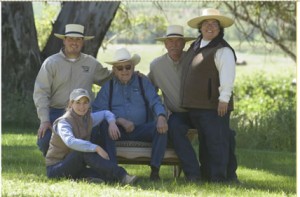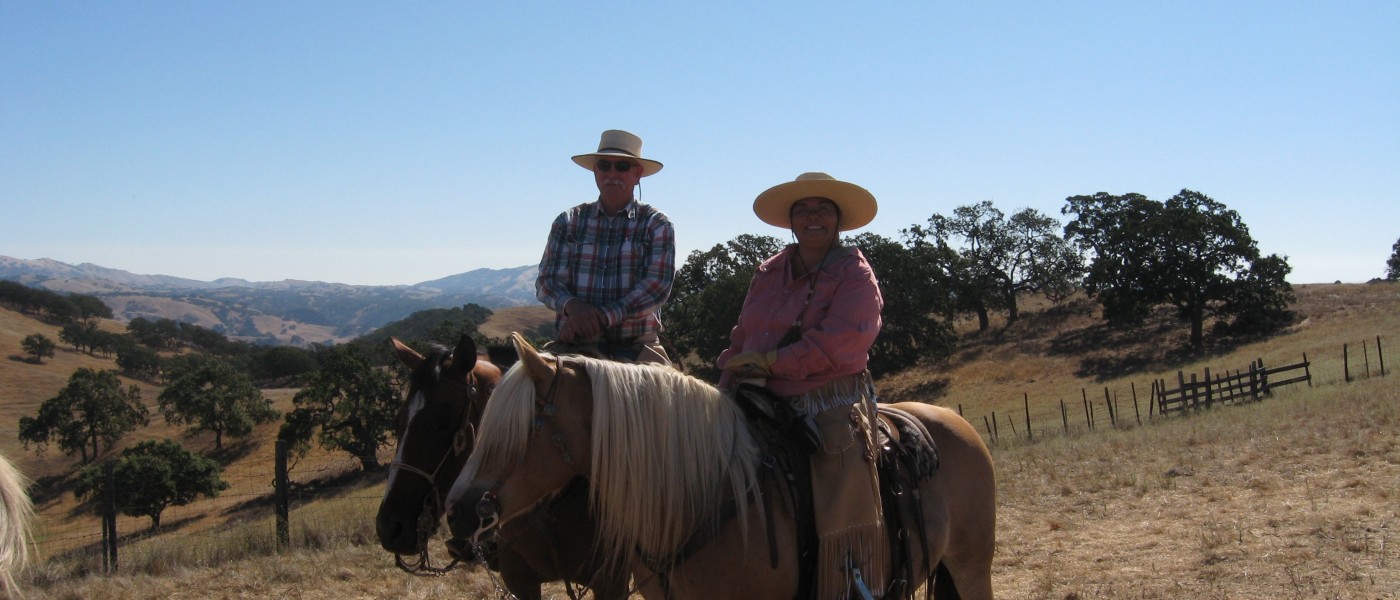Rosie and Ward Burroughs own and operate sustainable farms with their children in California’s Central Valley. The Burroughs continue to work hard to lower their carbon footprint, and to create nutrient rich soil that will benefit the future generations that will make a life and living from their farmland.
The Burroughs family has always had a commitment to provide quality dairy products to their customers. The family’s dairy roots started out with Benjamin Burroughs, who moved from Illinois to Oakland in 1896 to start Walnut Grove Creamery. Over a hundred years later, Benjamin’s grandson Ward and his family now own Burroughs Family Farms in California’s Central Valley, a flagship for marketing products that are produced by each of their family member’s individual farms.
Ward grew up completely immersed in the Burroughs farming family, and had no doubt in his mind that he wanted to carry on the family’s tradition when he grew up. After graduating with a Farm Management degree, he married Rosie and they moved onto his father’s land to get started in the dairy business. Rosie had always appreciated agriculture, and spent the majority of her childhood running around outdoors, convinced that a career working in agriculture would be the right fit for her. Rosie and Ward have worked hard to expand and transition the family’s farming tradition into the four organic operations that they run today.
With the expansion of their farm came the need for help, and Rosie and Ward’s children have taken over a lot of that responsibility by each taking over their own separate branch farm. Their farms produce milk for Organic Valley, as well as artisan cheeses, pasture-raised organic eggs, poultry, almonds, and a variety of small craft products. With three generations of the family currently involved in Burroughs Family Farms, there is a deep connection between the family and the industry that has such deep ties to their heritage.

The interconnected farms – including California Cloverleaf Farms, Full Circle Dairy, B & B Pastures, and Vista Livestock Company – all abide by the Burroughs family legacy of environmentally friendly and sustainable practices. Three dairy farms are fully organic, and Vista’s almonds are in the organic transition process with over 180 acres of organic almonds now available for harvest. The three dairy farms are also grass-based, with the cows receiving 70% of their feed from grass plants. This helps to reduce the farm’s dependence on off-farm feed and supports the ongoing challenge to increase soil and grass quality.
“That’s one of the areas that many of the organic farms, especially here on the west coast, are lacking in. I’m not sure that they have their soils where they need to be,” says Ward. For a grass-fed dairy farm like Cloverleaf, one of the very first steps in the nutrient cycle for the cows is the soil. Without nutrient-rich soil, the quality of the grass suffers, ultimately affecting the cows that are using the grass to produce the milk we drink. Soil biology and remediation takes years of hard work to see results, and Rosie and Ward continue to keep this as a top priority.
Rosie and Ward find it important to keep a constant cycle of grazing and replenishment to maximize both soil and cow nutrition. This process, known as Management Intensive Grazing (MIG), allows a certain plot of land to be grazed by the herd, and then completely regenerate before it is grazed again. Grass-fed cows spend ample time out on the pasture, dropping manure, which enters back into the ground as organic matter, rather than sitting in holding tanks or pits like in typical confinement dairy facilities. This reduces methane emissions while simultaneously fertilizing the soil in the pastures. This also provides a steady cycle of nutrient-rich grass for the cows to eat, and allows the land to run through its natural nutrient cycle to benefit the soil.
As our climate changes, thinking about our soil and the environment from an agricultural standpoint is going to be crucial. When you talk about changing temperatures, natural disasters, droughts, or energy and fuel concerns, no one is more vulnerable than our farmers. So what can farmers do to counteract and prepare for this type of change?
“As an organic farmer you need to look at the whole system,” explains Rosie. “Everything has a purpose and a balance, and there is a responsibility to protect and nurture the environment that we rely on.” This is why Rosie and Ward have integrated systems into their farm that protect not only their cows, but the entire biological cycle that is so involved in their business.
On the rolling foothills of the Central Valley the Burroughs have adopted a French drain system that channels excess water into storage ponds for later use. By channeling the water in this way, they are able to side-step the topsoil erosion and drainage problems that many farmers face on their land. Not only does this process replenish the aquifers beneath the fields, it also recycles all water for irrigation so that none of it leaves the farms.
“We have also added five different solar locations around our farm, which provide about 80% of the power that we need to irrigate our almonds during the summer,” Rosie says. This renewable power source helps to dampen some of the rising fuel and energy costs that are plaguing farmers around the country. Vista’s almond farm is also equipped with a weather station, and state-of-the-art soil moisture meters that are able to accurately detect moisture content and display it right on Benina’s phone. In this way, the fields are never over-watered or under-watered, saving money and giving the plants the optimal conditions to grow.
Rosie has also worked hard to cut down their costs of importing inputs from off the farm. “When you are developing your grass to have a nutrient dense quality, you eliminate the need to outsource feed and also run the heavy equipment that is necessary to produce and transport that feed,” she explains. This helps to reduce Green House Gas (GHG) emissions across the country and promote local and on-farm sustainability.
In fact, almost everything that is done on the Burroughs farm has sustainability and soil in mind, including their composting practices. They recycle and reuse everything from the cow manure to paper products, which are composted to provide nutrients for their soils. By avoiding commercial and synthetic fertilizers and pesticides and using their manure and compost instead, they are also reducing their carbon footprint, building and protecting their soil and its essential microbiology to a more natural input.
In terms of financial planning, Ward and Rosie have spent a great deal of energy getting it sustainable too. Since bringing in a specialist, they have been better able to track their expenses and determine sound future business plans for the success of their farm. “We would like to get more of the equity into the next generation,” explains Ward. The average age of farmers in the U.S. is 57 years old, and that average rises each year. For grandparents like Rosie and Ward, leaving their farm better off than when they got it is the single most important thing that they can accomplish for their family.
“Some of the things we have done on our farm have been financially challenging, but if something feels right, I am the type of the person that will find a way to gather the resources to put it together,” Rosie says. Rosie and Ward are involved in several organizations including the advisory board of California Climate and Agricultural Network (CalCAN), Grazer’s West, Western Organic Dairy Producers Alliance(WODPA), and Slow Food. These groups have brought awareness to different issues and have worked to promote climate-friendly farming and also advocate for organic production.
The key, though, is communicating these ideas successfully out to the public. “A lot of consumers know some things about organic and our type of system, but we need to work on that outreach more and more,” Ward says. “We are striving for sustainability for ourselves, our livestock, and our environment,” adds Rosie.
There will be serious challenges in the future of farming, and the most successful farmers will be at the forefront of preparing for extreme weather events, using renewable sources of energy, investing in soil health and nutrition, and planning out financial plans that will leave their farm in good shape for future generations. Rosie and Ward Burroughs have set themselves up very well for this type of future, and will continue to be on the cutting edge of climate-friendly farming practices as they pass their farm to the next generation.
Further Reading
- Want to know more about how climate change is affecting family farmers and what they are doing about it? Find out in Ask Farm Aid.




